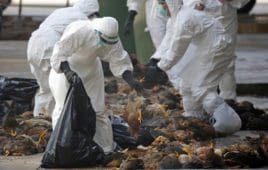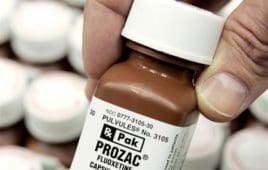Only about half of the cancer drugs approved by the European Medicines Agency in the last few years were later shown to help patients live longer or improved their lives, a new study says. Scientists in Britain and Latvia analyzed reports from the European regulator on cancer approvals from 2009 to 2013. Many of the…
For 1st Time, Over Half of People with HIV Taking AIDS Drugs
Old Mold from Penicillin Discoverer Auctioned for $14,617
How much is an old, dried out piece of mold worth? Apparently more than $14,600 if it was created by the doctor who discovered penicillin. The nearly 90-year-old swatch of mold has a rather extraordinary history: It came from the laboratory of Dr. Alexander Fleming whose revolutionary discovery brought the world its first antibiotic, credited…
UN Sees Bird Flu Changes but Calls Risk of People Spread Low
The World Health Organization says it has noticed changes in the bird flu virus now spreading in China, but says the risk of the disease spreading easily between people remains low. The genetic mutations have been seen from birds and infected people, but because flu viruses change constantly, experts aren’t exactly sure how significant the…
UN: Coffee No Longer Deemed Possible Carcinogen
The World Health Organization’s research arm has downgraded its classification of coffee as a possible carcinogen, declaring there isn’t enough proof to show a link to cancer. But the International Agency for Research on Cancer, or IARC, also announced in a report published on Wednesday that drinking “very hot” beverages of any kind could potentially…
Study: Most Antidepressants Don’t Work for Young Patients
Scientists say most antidepressants don’t work for children or teenagers with major depression, some may be unsafe, and the quality of evidence about these drugs is so bad the researchers cannot be sure if any are truly effective or safe. In the biggest analysis yet conducted of previously published studies, researchers studied 14 antidepressants and…






